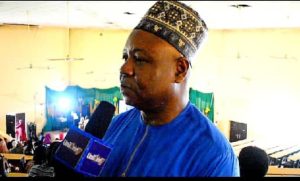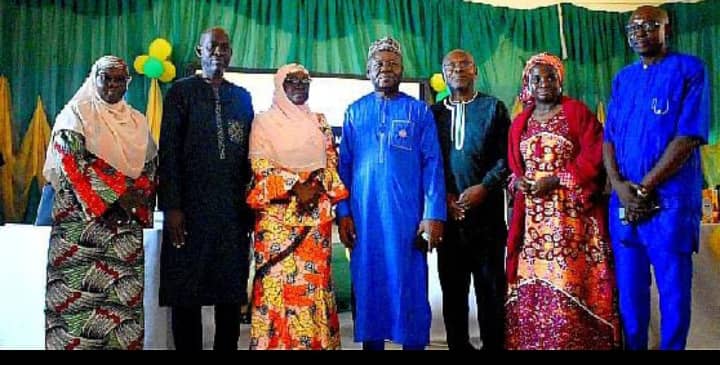
By The PrimeTimes
The 2025 edition of the Doyin Mahmoud Annual Lecture, held on Tuesday, June 17, at the University of Ilorin, delivered a powerful and thought-provoking message to Nigeria’s future media professionals: in the age of artificial intelligence and deepfakes, journalism must remain anchored in truth, ethics, and public trust.
With the theme “Journalism in the Era of AI-Generated Content and Deepfakes,” this year’s lecture drew an impressive array of media scholars, government officials, and communication professionals to the Communication and Information Sciences Lecture Theatre — all united in addressing the existential challenges AI poses to journalism.
Professor Isiaka Zubair Aliagan, a former editor of The Herald and keynote speaker at the event, described AI as “the most disruptive force journalism has ever encountered.” Tracing journalism’s evolution from analog pressrooms to today’s digital ecosystems, Aliagan painted a sobering picture of a media industry racing to keep up with technological innovation.
“Artificial intelligence has not merely knocked on journalism’s door,” Aliagan warned. “It has walked in, settled down, and is already reshaping the very foundations of how we create, distribute, and consume news.”
He illustrated the dangers through vivid examples: a fake image of a Pentagon explosion that disrupted the U.S. stock market, deepfakes impersonating world leaders, and AI-generated robocalls that mimicked political candidates. Closer to home, he pointed to cloned voices of Nigerian political and religious figures used to deceive the public.
Aliagan emphasized that AI, while useful for data analysis, translation, and automated reporting, threatens journalism’s most sacred pillars — truth and trust — when misused. He called for redefined editorial standards, AI detection technologies, and curriculum reforms to train journalists for this new reality.
Representing the Kwara State Government, Hon. Bolanle Olukoju, Commissioner for Communications, echoed Aliagan’s concerns in her keynote address. Delivered on her behalf by Dr. Fatimah Amuda, Olukoju stressed the need for journalists to adapt quickly to AI tools — not to replace ethical judgment, but to enhance verification, accountability, and balance.
“Journalism depends on two sacred currencies: truth and trust,” she stated. “Unchecked AI-generated content and deepfakes have the power to erode both.”
Olukoju challenged journalism students to become digitally smart, ethically grounded, and socially responsible, while urging media houses to invest in AI detection tools and the government to enact protective legislation that supports press freedom while combating disinformation.
She concluded with a rallying call to students that, “You are not just media students. You are the guardians of public trust in the age of digital illusion.”
Established in 2010, the annual lecture honours the late Alhaji Doyin Mahmoud, the founding Head of the Department of Mass Communication at Unilorin. This 15th edition, by all measures, lived up to its growing reputation as one of Nigeria’s premier academic events in media and communication.
The event attracted dignitaries including the Dean of the Faculty of Communication and Information Sciences, Prof. Lukuman Azeez; Kwara State Commissioner for Education, Dr. Lawal Olohungbebe; Dr. Patrick Udende, current HOD; and Professor Saudat Abdulbaqi, Head of Unilorin Television. Others present included Dr. Mahmud Abdulraheem, represented by Prof. Razak Owolabi Abdulkadir; Hon. Ibrahim Abdulateef, SSA on Communication to the Governor; and a cohort of respected academics and stakeholders.
Students under the Association of Mass Communication Students (AMCOS) were visibly inspired by the discussions. Several described the lecture as a wake-up call to master emerging technologies while remaining steadfast in the ethical values journalism demands.
The AMCOS Staff Adviser and faculty praised the organisers for sustaining the legacy of critical engagement and professional development initiated by the late Mahmoud.
In a world where fake content now competes with facts, the 2025 Doyin Mahmoud Lecture made a compelling case for a journalism that is both tech-savvy and ethically resilient. It was a call not just to adapt, but to lead — with courage, critical thinking, and a commitment to truth.
As Professor Aliagan closed his lecture, his final words lingered, “The future of truth itself may well depend on the choices we make today. Let us choose wisely, act courageously, and work together to ensure journalism continues to serve as democracy’s essential watchdog.”


